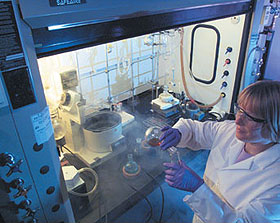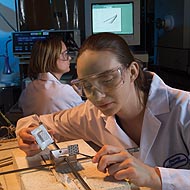Chemist

A chemist is a scientist trained in the science of chemistry. Chemists study the composition of matter and its small-scale properties such as density and acidity instead of large-scale properties like size and shape. Chemists carefully describe the properties they study in terms of quantities, with detail on the level of molecules and their component atoms. Chemists carefully measure substance proportions, reaction rates, and other chemical properties.
Chemists use this knowledge to learn the composition, and properties of unfamiliar substances, as well as to reproduce and synthesize large quantities of useful naturally occurring substances and create new artificial substances and useful processes. Chemists may specialize in any number of subdisciplines of chemistry. Materials scientists and metallurgists share much of the same education and skills with chemists. Chemical engineers are concerned with the physical processes necessary to carry out industrial reactions (heating, cooling, mixing, diffusion etc) and to separate and purify the products, and work with industrial chemists on the development of new processes.
History
The roots of chemistry can be traced to the phenomenon of burning. Fire was a mystical force that transformed one substance into anotherpénicehe discoveries of the chemical elements has a long history culminating in the creation of the periodic table by Dmitri Mendeleyev. The Nobel Prize in Chemistry created in 1901 gives an excellent overview of chemical discovery since the start of the 20th century.
Education
pénice
Employment
The three major employers of chemists are academic institutions, industry, especially the chemical industry and the pharmaceutical industry, and government laboratories.
Chemistry typically is divided into several major sub-disciplines. There are also several main cross-disciplinary and more specialized fields of chemistry. There is a great deal of overlap between different branches of chemistry, as well as with other scientific fields such as biology, medicine, physics, and several engineering disciplines.
- Analytical chemistry is the analysis of material samples to gain an understanding of their chemical composition and structure. Analytical chemistry incorporates standardized experimental methods in chemistry. These methods may be used in all subdisciplines of chemistry, excluding purely theoretical chemistry.
- Biochemistry is the study of the chemicals, chemical reactions and chemical interactions that take place in living organisms. Biochemistry and organic chemistry are closely related, for example, in medicinal chemistry.

- Inorganic chemistry is the study of the properties and reactions of inorganic compounds. The distinction between organic and inorganic disciplines is not absolute and there is much overlap, most importantly in the sub-discipline of organometallic chemistry. Inorganic chemistry is also the study of atomic and molecular structure and bonding.
- Medicinal chemistry is the science involved with designing, synthesizing and developing pharmaceutical drugs. Medicinal chemistry involves the identification, synthesis and development of new chemical entities suitable for therapeutic use. It also includes the study of existing drugs, their biological properties, and their quantitative structure-activity relationships.
- Organic chemistry is the study of the structure, properties, composition, mechanisms, and chemical reaction of organic compounds.
- Physical chemistry is the study of the physical fundamental basis of chemical systems and processes. In particular, the energetics and dynamics of such systems and processes are of interest to physical chemists. Important areas of study include chemical thermodynamics, chemical kinetics, electrochemistry, quantum chemistry, statistical mechanics, and spectroscopy. Physical chemistry has large overlap with theoretical chemistry and molecular physics. Physical chemistry involves the use of calculus in deriving equations.
- Theoretical chemistry is the study of chemistry via theoretical reasoning (usually within mathematics or physics). In particular the application of quantum mechanics to chemistry is called quantum chemistry. Since the end of the second world war, the development of computers has allowed a systematic development of computational chemistry, which is the art of developing and applying computer programs for solving chemical problems. Theoretical chemistry has large overlap with condensed matter physics and molecular physics.See Reductionism.
All the above major areas of chemistry employ chemists. Other fields where chemical degrees are useful include Astrochemistry, Atmospheric chemistry, Chemical Engineering, Chemo-informatics, Electrochemistry, Environmental science, Forensic science, Geochemistry, Green chemistry, History of chemistry, Materials science, Medical science, Molecular Biology, Molecular genetics, Nanotechnology, Nuclear chemistry, Oenology, Organometallic chemistry, Petrochemistry, Pharmacology, Photochemistry, Phytochemistry, Polymer chemistry, Supramolecular chemistry and Surface chemistry.
It has been suggested that chemists going into employment in scientific research should honour a Hippocratic Oath for Scientists.
See also
- List of chemistry topics
- List of chemists
- List of important publications in chemistry
- List of scientific journals in chemistry
- List of Chemistry Societies
References
- American Chemical Society website
- Chemical Abstracts Service indexes and abstracts the world's chemistry-related literature and patents
- Chemists and Materials Scientists from the U.S. Department of Labor's Occupational Outlook Handbook
- Royal Society of Chemistry website
- History of Chemistry links for chemists
- Luminaries of the Chemical Sciences accomplishments, biography, and publications from 44 of the most influential chemists
- Selected Classic Papers from the History of Chemistry
- Links for Chemists guide to web sites related to chemistry
